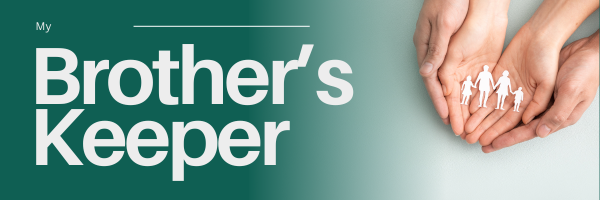My brother’s keeper. Those words had become my identity. I planned my life around making sure my brother stayed alive. I constantly checked his location. I made sure he had food. I thought about him every hour of the day. I ran to his rescue every time — every wreck, every call, every psych stay. I sought help for him daily. But the truth was, he wasn’t ready.
Keep in mind, I have a husband and three children. Yet, I put so much energy into his life and neglected my own. I thought I was helping him, but in reality, I was enabling him. I became a crutch that kept him from standing on his own.
It wasn’t until I stopped — until I completely cut him off — that things began to change. I waved goodbye with tears in my eyes as my brother left for Vegas, hoping for a fresh start. I let him go, knowing this might be the last time I’d see him. It was the hardest thing I’ve ever done, but I knew that putting all my energy into keeping him alive was no longer sustainable.
Something remarkable happened when I stepped back. My brother hit his rock bottom, but it gave him the clarity he needed. One day, he called and asked for help. This time, he was ready. He went to treatment, got sober, and began rebuilding his life. Today, he’s a new person, and I finally have my brother back. But the journey taught me a powerful lesson: I had to stop being his keeper so he could become his own.
Advice for Families
If you find yourself in the role of “My Brother’s Keeper,” here are some lessons I learned that may help you navigate this difficult journey:
1. Understand the Difference Between Helping and Enabling
Helping empowers your loved one to take responsibility for their actions. Enabling shields them from consequences and allows destructive behaviors to continue. Take a step back and evaluate whether your actions are truly helping.
2. Set Healthy Boundaries
Boundaries are not walls; they are guidelines for how you will and won’t engage. Decide what behaviors you’re willing to tolerate and communicate those limits clearly. Sticking to them is an act of love, even when it feels cruel.
3. Take Care of Yourself First
You can’t pour from an empty cup. Prioritize your own mental, emotional, and physical health. Seek therapy or join a support group. Your well-being is just as important as your loved one’s recovery.
4. Let Go of Guilt
Addiction is a disease, and you are not responsible for your loved one’s choices. You can’t fix them. Let go of the guilt and remind yourself that their recovery is ultimately up to them.
5. Allow Natural Consequences
As hard as it is to watch, your loved one needs to experience the consequences of their actions. Shielding them delays the wake-up call they might need to seek help.
6. Be Ready When They’re Ready
Recovery often begins when the person asks for help. Be prepared with resources and options for treatment. When they’re ready to take the first step, your support can make all the difference.
7. Celebrate Progress, Not Perfection
Recovery is not a straight line. Celebrate small victories along the way and encourage them to keep going, even if they stumble.
Letting go of my role as “My Brother’s Keeper” was the hardest and most transformative decision I’ve ever made. It saved both of us. If you’re walking a similar path, know that you are not alone. There is hope, and there is help for both you and your loved one.
If you or a loved one needs help, contact our 24/7 information and intake line at 833.780.3088. Second chances are only a call away.


Recent Comments